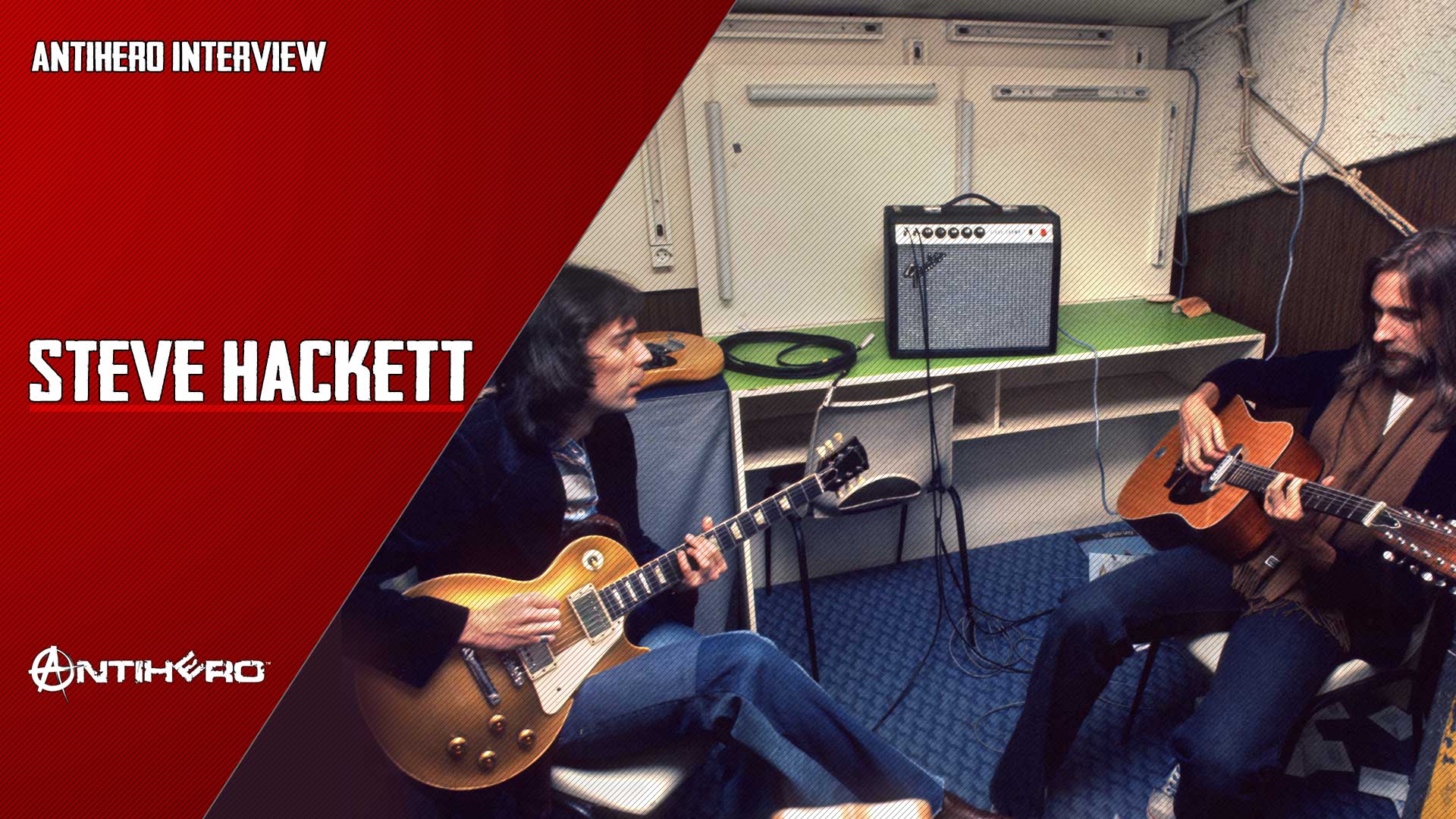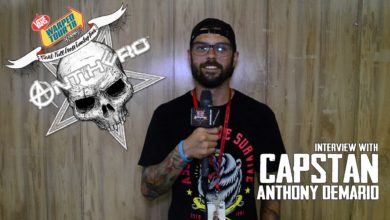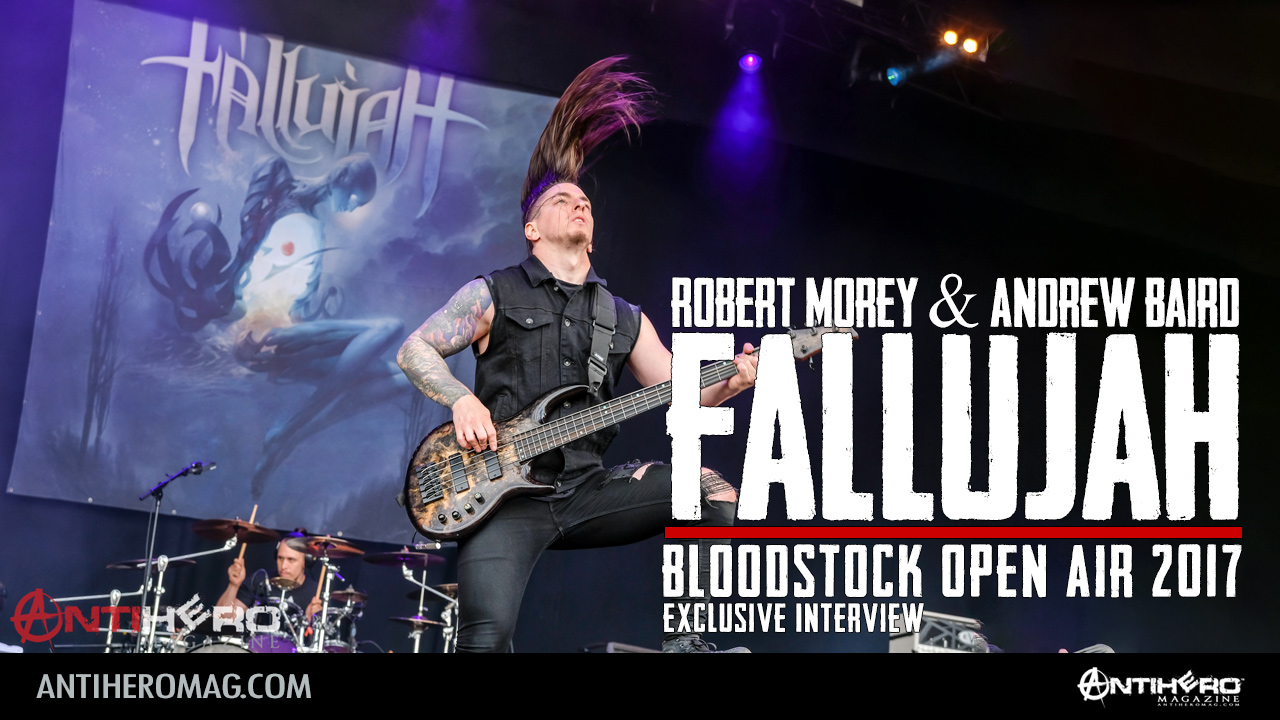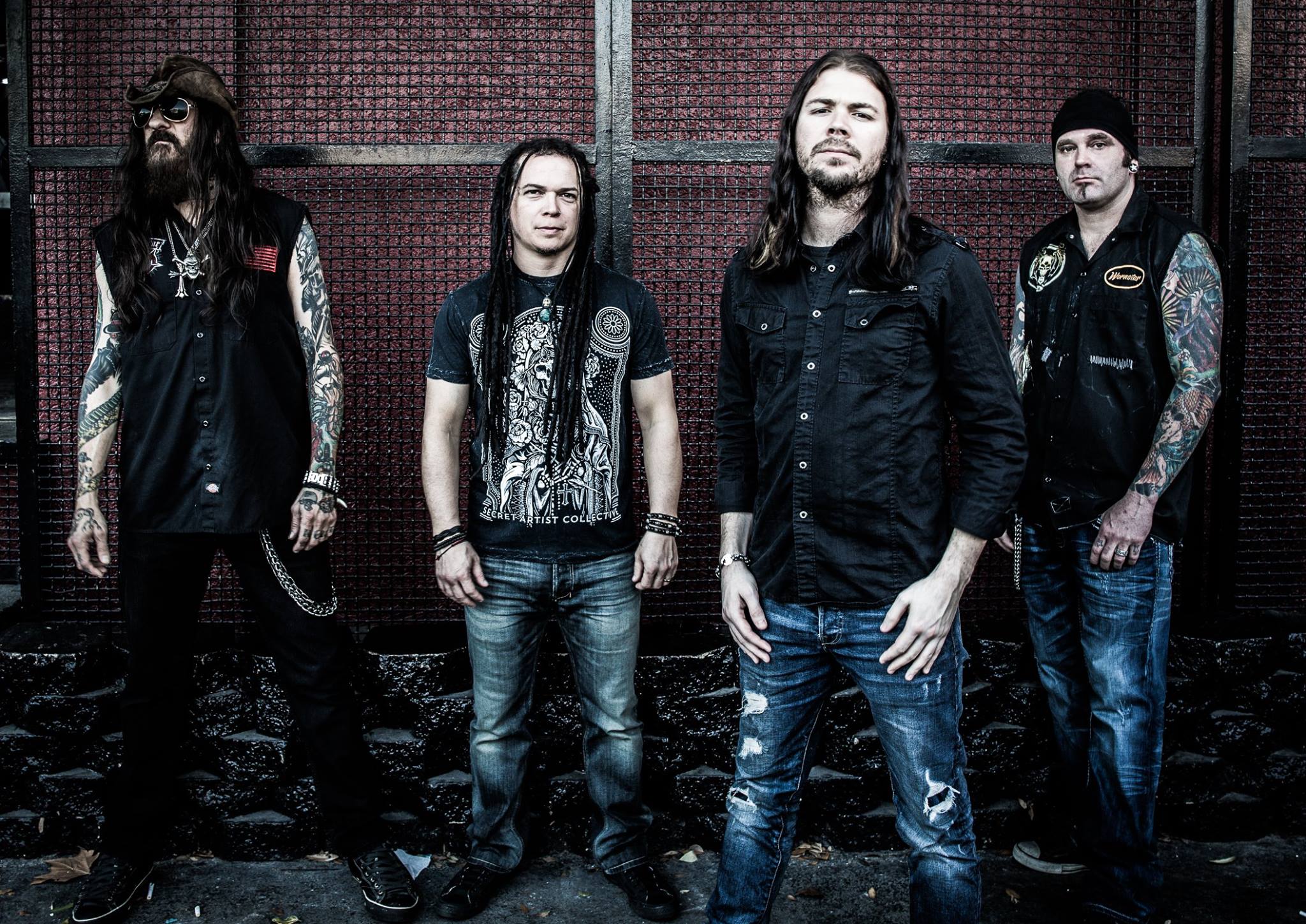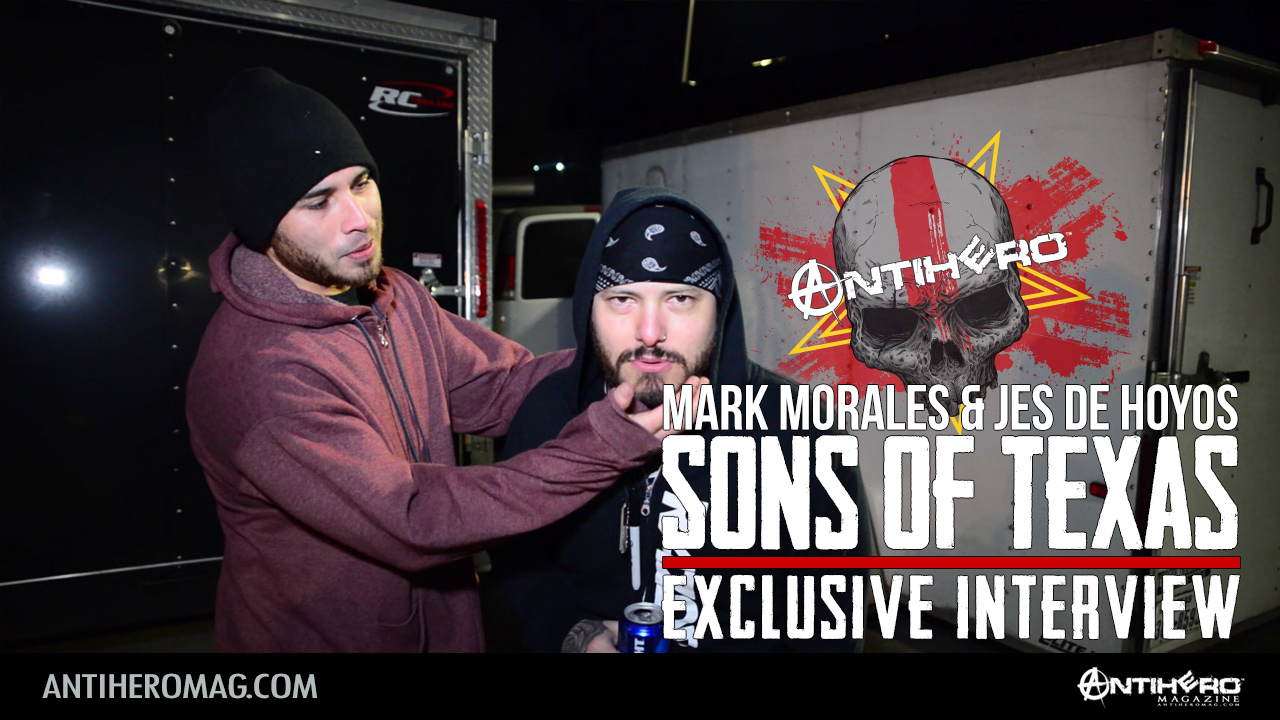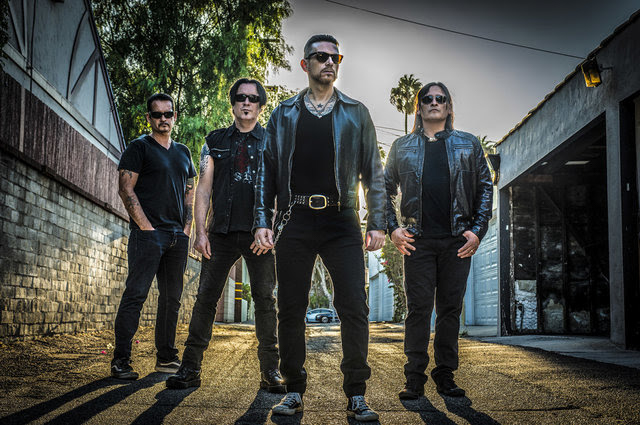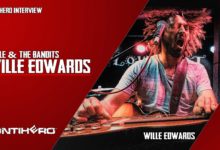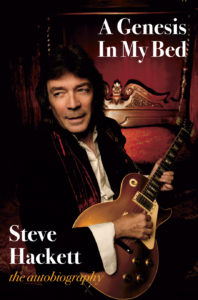 July 2020 sees the publication of “A Genesis In My Bed” – the long overdue autobiography from guitar great and former member of Genesis, Steve Hackett. As with his music, Steve has written a highly detailed, entertaining and embracing tome that charts his life in full, but with a firm emphasis on his years with Genesis that saw the band’s meteoric rise to become one of the most successful British bands of all time.
July 2020 sees the publication of “A Genesis In My Bed” – the long overdue autobiography from guitar great and former member of Genesis, Steve Hackett. As with his music, Steve has written a highly detailed, entertaining and embracing tome that charts his life in full, but with a firm emphasis on his years with Genesis that saw the band’s meteoric rise to become one of the most successful British bands of all time.
Steve talks candidly about his early life, his time with Genesis, and in particular his personal relationships with the other four band members, with great insight into the daily goings on of this major rock band.
ANTIHERO: How have you been spending the enforced extra time that you have on your hands?
Steve Hackett: Well, I’ve been doing a lot of recording and we’ve got the book, which is just released, and I’ve been doing lots of different projects. There’s a live album and an acoustic album, orchestral album and some rock stuff, so I’m going to be very busy touring next year. So I’m doing as much recording as I can this year.
ANTIHERO: You mentioned there the book. I was just wondering; it has been described in the pressers as that it’s taken 15 years to bring it to life. Why has it taken so long? Was that purely due to the amount of workload that you had to get it actually up and running?
Steve Hackett: Yeah, that’s absolutely right. It wasn’t 15 years of consistent work. What it was, was my wife and I, Joe and I, we were talking. It was as much as 15 years ago about doing a book, and most of the effort into it really happened in the last two years. I did a lot of rewriting with it because it needed to be rewritten. It’s funny, you read something back and you think, “Oh yeah, I think I managed to describe that situation.” But then you realise that you’re not just trying to give people the facts, but also to colour it in a way. And yeah, it’s more than just explaining yourself. It’s trying to be your best poetic self at the same time.
ANTIHERO: Was the book something that you’d always wanted to do or was it actually prompted by an approach from a publisher?
Steve Hackett: Well, funnily enough, I was approached by an agent several years ago and then we lost touch with that guy. But so for a while I had a literary agent, but we just decided in the end to go with a friend of ours who we’d done business with before. And so Jerry Bloom, we went with his company. And so I think we didn’t really need any middleman, if you know what I mean.
ANTIHERO: What about then the creative process itself? Have you got a great memory? I’m thinking obviously the book goes way back to your early days, early development in the music industry. I just wondered, have you total clarity of that early period of your life?
Steve Hackett: Well, yeah, I think my memory is pretty good for certain things. And I certainly have a whole host of impressions from the very early 1950s onwards. It’s emblazoned on my memory. Or I had to check certain facts of course, dates and places that I’ve been, but a lot of that stuff is very well documented, so it is possible to check all of that stuff. So it’s not totally reliant on my own memory. And of course, certain albums I have to check the years that these albums were done.
It’s easier when I look back at the seventies, I’ve got a pretty good grasp of pretty much the whole of the 1970s, but then it starts to get hazier after that. So once I hit my thirties, yeah, there’s certain things they say that you … Say goodbye to your memory after 30, and your stomach. Yeah, certain things. Didn’t drink as much as I used to, couldn’t smoke as much as I wanted to. I couldn’t do certain things, but then I started getting fit in my thirties. And so I was fit once again, having given up some of the poisons.
ANTIHERO: How then did the creative process of writing the book differ from actually writing an album?
Steve Hackett: Well, writing songs, even ones that take as long as one I’m working on at the moment. I’m working on a song, but that requires a lot of attention to detail. This song might take three weeks to record from start to finish, but a book that can take you three years. It’s a long form. It’s not as if anyone can write it for you. If you want to write the best kind of book, it’s going to take your time. And the frustrating thing about writing is, you might be taking a shower and you suddenly get all the ideas in your head of the things that you should be talking about in the book. So, I started to write down subheadings of things that I wanted to talk about. So, bullet points, that was very, very important. So, bullet points, dates, chronology, there is a kind of science to writing a book. And I only discovered it as I went along.
ANTIHERO: When you set out to write the book, did you employ any limitations or censorship in terms of particular individuals or events that you knew you would be referencing in the book?
Steve Hackett: Certainly, I thought … The tactic I wanted to employ was to stress the positives of all the guys that I’d worked with. I didn’t think it was worth writing a book that was competitive. And I certainly didn’t want to be bitchy. I felt that I had many things to be grateful for, so the positives outweigh the negatives hugely. That was how I decided to work it.
ANTIHERO: How did you find the whole process; did you feel it was a healing process? Was it emotional at times or indeed therapeutic?
Steve Hackett: I think it was healing, and it was nice to be able to say all the sweet things that I wanted to say about people who might think that I could be gunning for them in my sets. But I didn’t see it like that. I thought that when I’ve read the autobiographies of some of the other guys in Genesis, I thought that perhaps they could have been more generous with each other. And so I was anxious not to write a competitive book. If I was going to write a competitive book, I didn’t think the way to do that was with put-downs. It just had to be a very well-written book.
And I wrote it as well as I could within the time frame and of course, there’s always that thing of a deadline looming. And I knew that I had an American tour and it had to be completed all before that. So towards the end of the book it was a little rushed, but we had a little bit more time after the American tour. And I got in there and Joe did a few things and I thought it stacked up pretty well, but it’s a very nervous process, writing a book. You think you’d have forever to read someone else’s book, you never have forever to write your own book. And this is me as a first-time writer, first- time author with a book. So maybe if I write anything in the future, I’ll make sure that I don’t want to flounder on the same rock of deadline, deadline, deadline. Watch out for that.
ANTIHERO: Obviously then you mentioned that your US touring plans were abruptly ended by what’s going on in the world. I just wondered long-term; did you have any plans to actually actively promote the book? I see a lot of musicians who have written books go out and do a spoken-word type format, where they read extracts from the book, maybe play a couple of songs. Had you any plans or designs to pursue something in a similar vein?
Steve Hackett: Yeah, we were going to do all of that, all of the above. But what happened was, the problem was we had to just, to honour the release date, to go with that and say, “Well, we don’t know if shops will be open. We don’t know if people will be able to access this, that and the other.” There won’t be a big party to celebrate it where everyone gets invited and the press and all of that. It was always going to be a small affair compared to that. But I haven’t been doing track chat videos.
I’ve been doing these videos and releasing them via the website and talking about people’s favourite tracks. So I have been staying in touch with people, perhaps far more than I would normally do, because we’re not in the world that we were a few months ago. So I am accessing a public, but not in the, I go out and meet you and sign things, sort of way. I’ve signed a whole tonne of books ahead of time, and they’ve all sold out. I’ve signed inserts. I’ve signed the books themselves. There’s been masses of that and the book seems to have sold out all the time and went to number 14 in the Amazon charts over here, which is amazing, frankly. So, top 14 of autobiographies, or is it top 14 of rock autobiographies? I don’t know. I. I think that’s it, it’s autobiographies.
So, I’m very pleased with the progress of that. It’s a good time to read books. So, I’m reading all sorts of books at the moment. I’m reading Anne Brontë at the moment, The Tenant of Wildfell Hall. I’m taking the time to read the Brontës, and I’m taking time to read Norman Mailer and books that might be a little slower than I would be used to reading.We’ll be reading Dr. Raymond Moody’s Life After Life, evidence for survival after death. So I’m an avid reader at the best of times. I like reading and I’m full of admiration for people who can write the books themselves, because I know what the process is like. It’s not a quick process. You do have to be very organised.
ANTIHERO: Just moving on. In recent years, we have sadly lost many musical icons and a few days ago, Peter Green died also. I see you’ve actually been quoted as saying he was a great influence on you personally. I just wondered if you had any little memories, anecdotes, or stories of Peter that you can share.
Steve Hackett: Well, I used to go and see him when I was 16 years old. When I was underage drinking, I went to see the kind of beer and blues gigs that he was doing with John Mayall. Prior to the formation, maybe two years prior to the formation of Fleetwood Mac. And he was the go-to guitarist at that time, I just thought he sounded fabulous. And he had a great sound. Although he reined it in a little bit after that. I think by the time he was doing Fleetwood Mac, I think he wasn’t so much the guitar hero as a singer who happened to be playing guitar. Whereas when he was with John Mayall, there were lots of solos. I loved his playing. I would have been really thrilled to have played like that.
I remember walking into one gig, it was Eel Pie Island. And I used to go regularly on a Sunday night. And I arrived. And I remember exactly what he was playing, he was playing a piece that had been written by Freddie King called The Stumble. It’s a well-known blues guitarist piece. And I walked in just as he was playing the difficult double note section. And he was playing it and he was looking at John Maddings laughing at the time, and it just sounded so great. And I thought, “Oh, wow.” It seemed to be effortless. And he seemed to have joy on his face as he was doing that.
And of course, it’s very different when you’re on stage, you’ve got the pressure of being everyone else’s night out. And I know what that’s like, and you can’t receive it in the same way that you can when you’re watching someone else. The audience doesn’t have the pressure of that. I know Eric Clapton talked about the pressure of performance. Everybody feels it. There’s no doubt about it. You think, “Oh, I better make sure I’m good.” But when you just walk in and you see a band that happens to sound great, and you watch another guy who happens to be sounding inhumanly good, and that exists on record with Peter Green.
I had an old friend over yesterday and I started playing stuff. We used to listen to the blues stuff. I went to see him many times live, particularly in the mid 1960s. And I thought he was just absolutely brilliant. One of the tracks I love him playing is his version of So Many Roads with John Mayall; John Mayall singing the lead. But the guitar work on it is just brilliant. It’s slow blues work. It’s absolutely the best, it’s brilliant. One of those iconic tracks. I always loved that. I always loved Oh Well. I always loved many things that were really great. There’s Looking Back, which is a great track, great guitar work on that. There’s so much. Man of the World, of course. Sad, but somehow stunningly honest.
ANTIHERO: If I could just move on then with a couple of general questions? What in your professional career are you most proud of?
Steve Hackett: I’m most proud of John Lennon saying that Genesis was one of the bands that he was listening to in 1973, when we’d just done Selling England by the Pound. I’m also proud of Yehudi Menuhin choosing a piece of mine when he was putting together a programme on British gardens, a film that was made, From Kew to Finhorn. The pieces on it were classical. My piece was for acoustic guitar and flute. I was very proud. Particularly because I’d seen those two characters on British TV having an argument at one point. So they had a lot to disagree about, but it seems as if there was an agreement somewhere with my name on it.
ANTIHERO: How do you view your own musical legacy? Do you see it as two separate chapters or one following on naturally from the other?
Steve Hackett: Well, I think it’s all one thing really. I was always obsessed with music. Ever since I was two years old, I was trying to make music. There’s no doubt about it, that it starts young. So that search for whatever the elusive thing was that’s called music, has been a lifelong quest, and somehow, it’s this indefinable magic thing that stands right in front of me. I get inspired by so many different kinds of music. And the passion for doing that and expressing it gets stronger all the time.
ANTIHERO: Having done many interviews, is there any personal hero or inspiration that you would like to sit down and interview if you had the opportunity?
Steve Hackett: Oh, goodness me! Me interviewing other people. Well, I don’t know if I’d be asking the right questions. But I always found Buffy Sainte-Marie a fascinating character, and I’ve had a few conversations with her, but it’s always been on the run. It’s always been either at a gig of hers or at a gig of mine, and never really being able to have enough of the conversation. But I am fascinated with what motivated her early and brilliant work.
ANTIHERO: Just the final one. What lies ahead for you? Do you still have hopes, dreams and aspirations?
Steve Hackett: Well, I think it’s to keep going with as much diverse work as possible and to wear as many different hats as possible, whether that’s with classical guitar playing with a hint of flamenco influence in it, or whether it’s electric guitar work with a hint of blues in it. But rock and blues are two huge influences, and I had to lie somewhere in between those two things. There’s two schools of thought, there’s the spontaneous and there’s the crafted stuff. So form and spirit, what do you give the form and what do you give the spirit? I’ve been recording today and it’s all been on form. Tomorrow I’m going to give it spirit, give it some laldy, as they say in Scotland.
ANTIHERO: Steve, that’s great. Thank you very much. Good luck with the book. Hopefully, I will get to see you sometime in the near future, out on a tour maybe, either playing live or promoting the book.
Steve Hackett: Thank you so much. It’s been nice talking to you, Mark. Thank you so much. All the best.

